#and obviously i disagree with you
Explore tagged Tumblr posts
Text
.
#anon i'm not posting what you send#i really don't get why waste time in blogs you don't agree with#is not worth to spend time or engage with content you don't like or disagree with#and obviously i disagree with you#curate your experience i promise you fandom is more fun when you see only content you like#i hope you have a nice day
1 note
·
View note
Text
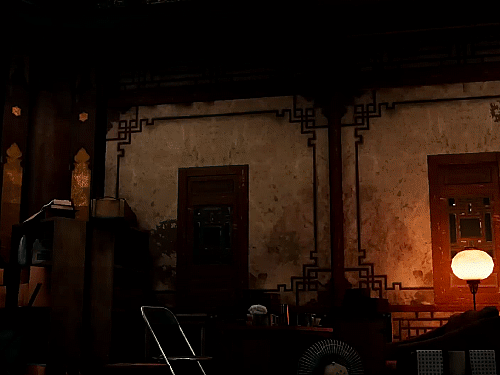




"Good job, Aerith!" "It was nothing compared to you!" // "I'm so glad you're all okay!" "Right back atcha."
#ffvii remake#ffvii rebirth#aerith gainsborough#tifa lockhart#aerti#aerith x tifa#ffvii rebirth spoilers?#i love them so much#and i'm sure someone's already made this gifset but better... but why not?#i quoted their first and last high five dialogue#aerti high fives are adorable and romantic too i think#but obviously feel free to disagree#ffviiedit#ffviiredit#tifalockhartedit#aerithgainsboroughedit#aertiedit#pls not aerith's little hop/jump and tifa leaning in... it's too cute#twitter could never make me hate either one of these ladies#i might be missing a high five or two so if you can let me knoe which ones i'm missing that'd be great!
2K notes
·
View notes
Text
just constantly thinking about percy telling vex that he’d like to think they’re all better than they think they are (except her brother, of course) . constantly thinking about when vex tells percy he’s a good man and he gets awkward and flustered and returns that she’s a good woman and when she gets as awkward and flustered he goes “see. it’s not very nice is it.” percy shouting to ripley that he forgives her and vex carves forgive into the wood of her bow. vex tells percy to take off his mask and percy comes across vex in tears and scrubbing at her armour. god. the campaign starts and percy is making arrows as flirting and getting kisses in return and the campaign ends and exhausted and knowing it won’t be a want that will be fulfilled percy admits he never wants to make another weapon and vex equally exhausted affirms that he’ll never Have to. and god . god . opposites attract is great or whatever but the deliciousness of dynamics where the characters hold up a mirror to one another where they get to shed the burden of self and see someone Like Them as someone good or capable of being better and Falling In Love. and that love being a pathway to them coming to grips with their own image and their own capacity to be better. and that the fact that the person they fall for being someone so Familiar means that they see through each other’s shit. that percy sees that vex has fallen into the trap of Nobility tricking people into thinking that makes them inherently better and giving her the only whitestone title someone has to earn beyond selection or marriage or birth. that vex sees percy forgive ripley and discusses the importance of that choice but reminds him that it’s just as important that he forgive himself.
#idk what’s in the air man maybe s3 of tlovm but in general i have been in a perc’ahlia Mood lately they r my lifeblood#i’m just always a big fan of mirror characters that ar simultaneously like spider-man pointing meme but also different enough that#they can each look at each other and be like Well Yes Obviously THEY are deserving of love/worth care/a good person/etc.#BUT IM. much too different in a different circumstance that it couldn’t possibly be true of me#it’s also just. stupid cute to me that part of percy and vex’s flirting and falling for each other was the mutually admitted and expressed#‘i think you’re a wonderful person and I Know you disagree and you think I’m a wonderful person and I Disagree’#vex’ahlia#percy de rolo#percy + vex#perc’ahlia#i’m just gonna start calling it manifesting when i tag perc’ahlia things as#tlovm spoilers#glintshore my eyes are upon yee .#critical role#cr1
512 notes
·
View notes
Text
Very interesting to me that a certain subset of the BES fandom's favourite iterations of Mizu and Akemi are seemingly rooted in the facades they have projected towards the world, and are not accurate representations of their true selves.
And I see this is especially the case with Mizu, where fanon likes to paint her as this dominant, hyper-masculine, smirking Cool GuyTM who's going to give you her strap. And this idea of Mizu is often based on the image of her wearing her glasses, and optionally, with her cloak and big, wide-brimmed kasa.
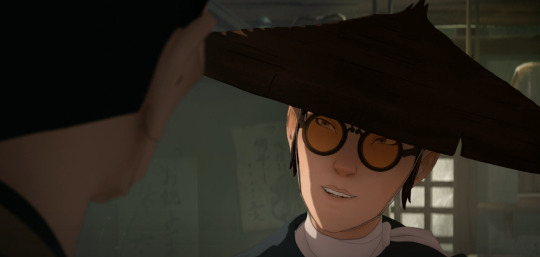

And what's interesting about this, to me, is that fanon is seemingly falling for her deliberate disguise. Because the glasses (with the optional combination of cloak and hat) represent Mizu's suppression of her true self. She is playing a role.

Take this scene of Mizu in the brothel in Episode 4 for example. Here, not only is Mizu wearing her glasses to symbolise the mask she is wearing, but she is purposely acting like some suave and cocky gentleman, intimidating, calm, in control. Her voice is even deeper than usual, like what we hear in her first scene while facing off with Hachiman the Flesh-Trader in Episode 1.
This act that Mizu puts on is an embodiment of masculine showboating, which is highly effective against weak and insecure men like Hachi, but also against women like those who tried to seduce her at the Shindo House.
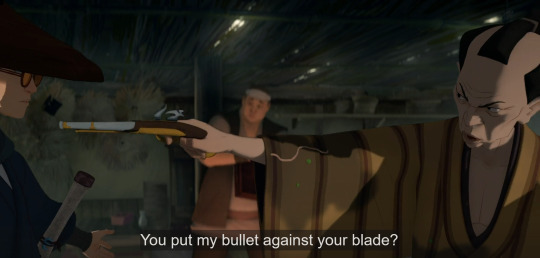

And that brings me to how Mizu's mask is actually a direct parallel to Akemi's mask in this very same scene.
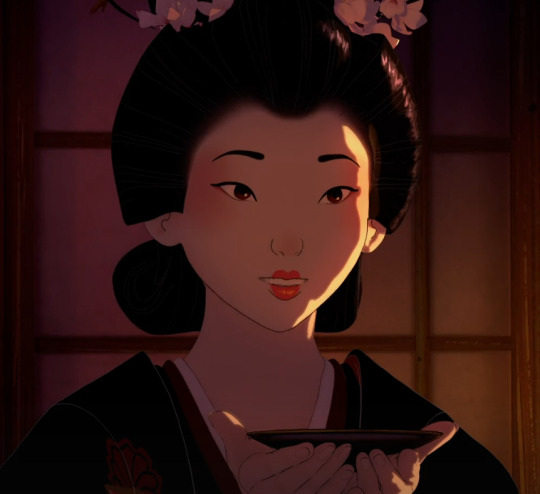
Here, Akemi is also putting up an act, playing up her naivety and demure girlishness, using her high-pitched lilted voice, complimenting Mizu and trying to make small talk, all so she can seduce and lure Mizu in to drink the drugged cup of sake.
So what I find so interesting and funny about this scene, characters within it, and the subsequent fandom interpretations of both, is that everyone seems to literally be falling for the mask that Mizu and Akemi are putting up to conceal their identities, guard themselves from the world, and get what they want.
It's also a little frustrating because the fanon seems to twist what actually makes Mizu and Akemi's dynamic so interesting by flattening it completely. Because both here and throughout the story, Mizu and Akemi's entire relationship and treatment of each other is solely built off of masks, assumptions, and misconceptions.
Akemi believes Mizu is a selfish, cocky male samurai who destroyed her ex-fiance's career and life, and who abandoned her to let her get dragged away by her father's guards and forcibly married off to a man she didn't know. on the other hand, Mizu believes Akemi is bratty, naive princess who constantly needs saving and who can't make her own decisions.
These misconceptions are even evident in the framing of their first impressions of each other, both of which unfold in these slow-motion POV shots.
Mizu's first impression of Akemi is that of a beautiful, untouchable princess in a cage. Swirling string music in the background.
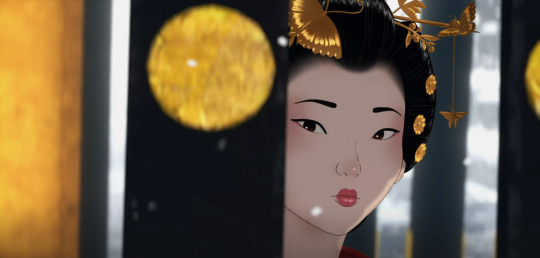
Akemi's first impression of Mizu is of a mysterious, stoic "demon" samurai who stole her fiance's scarf. Tense music and the sound of ocean waves in the background.

And then, going back to that scene of them together in Episode 4, both Mizu and Akemi continue to fool each other and hold these assumptions of each other, and they both feed into it, as both are purposely acting within the suppressive roles society binds them to in order to achieve their goals within the means they are allowed (Akemi playing the part of a subservient woman; Mizu playing the part of a dominant man).
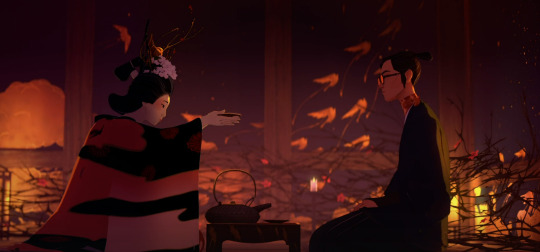
But then, for once in both their lives, neither of their usual tactics work.
Akemi is trying to use flattery and seduction on Mizu, but Mizu sees right through it, knowing that Akemi is just trying to manipulate and harm her. Rather than give in to Akemi's tactics, Mizu plays with Akemi's emotions by alluding to Taigen's death, before pinning her down, and then when she starts crying, Mizu just rolls her eyes and tells her to shut up.
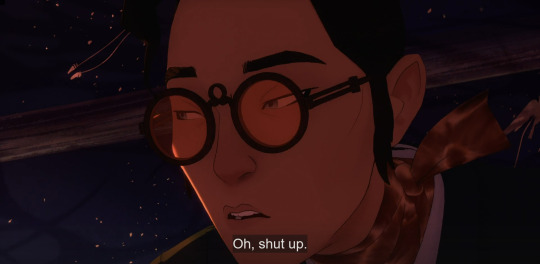
On the opposite end, when Mizu tries to use brute force and intimidation, Akemi also sees right through it, not falling for it, and instead says this:
"Under your mask, you're not the killer you pretend to be."
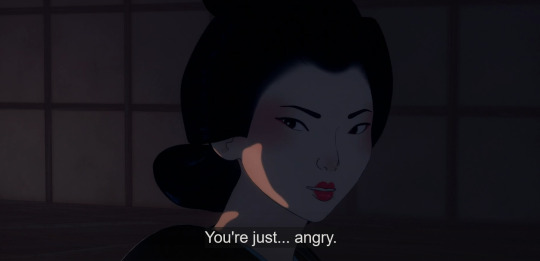
Nonetheless, despite the fact that they see a little bit through each other's masks, they both still hold their presumptions of each other until the very end of the season, with Akemi seeing Mizu as an obnoxious samurai swooping in to save the day, and Mizu seeing Akemi as a damsel in distress.
And what I find a bit irksome is that the fandom also resorts to flattening them to these tropes as well.
Because Mizu is not some cool, smooth-talking samurai with a big dick sword as Akemi (and the fandom) might believe. All of that is the facade she puts up and nothing more. In reality, Mizu is an angry, confused and lonely child, and a masterful artist, who is struggling against her own self-hatred. Master Eiji, her father figure who knows her best, knows this.
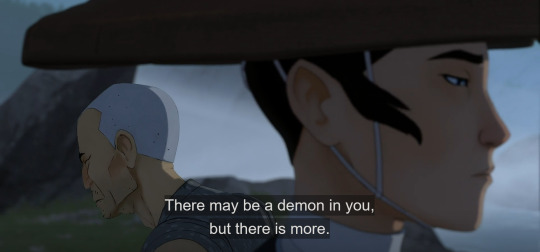
And Akemi, on the other hand, is not some girly, sweet, vain and spoiled princess as Mizu might believe. Instead she has never cared for frivolous things like fashion, love or looks, instead favouring poetry and strategy games instead, and has always only cared about her own independence. Seki, her father figure who knows her best, knows this.
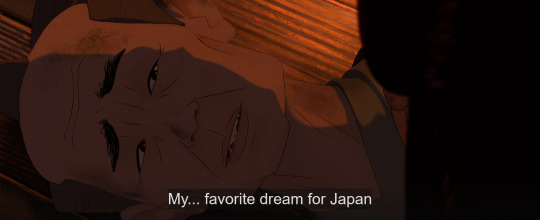

But neither is she some authoritative dominatrix, though this is part of her new persona that she is trying to project to get what she wants. Because while Akemi is willful, outspoken, intelligent and authoritative, she can still be naive! She is still often unsure and needs to have her hand held through things, as she is still learning and growing into her full potential. Her new parental/guardian figure, Madame Kaji, knows this as well.
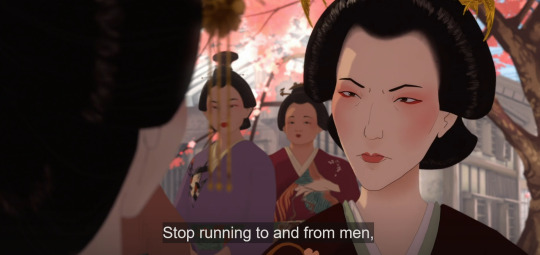
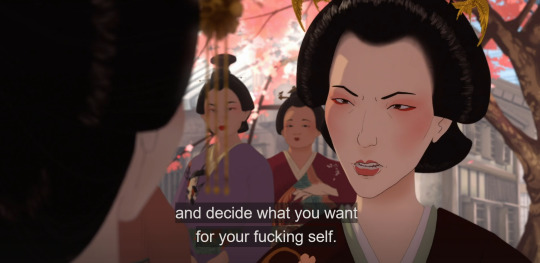
So with all that being said, now that we know that Mizu and Akemi are essentially wearing masks and putting up fronts throughout the show, what would a representation of Mizu's and Akemi's true selves actually look like? Easy. It's in their hair.
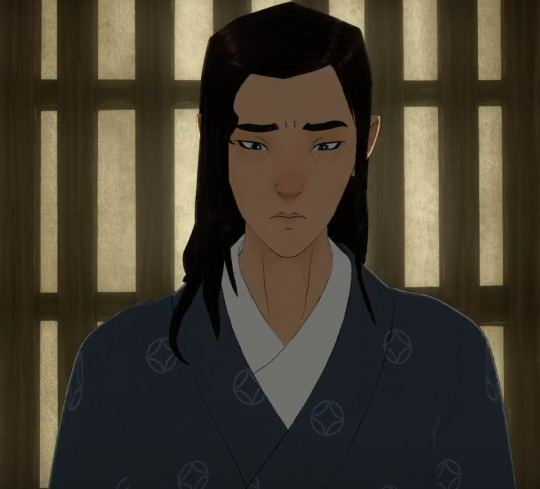

This shot on the left is the only time we see Mizu with her hair completely down. In this scene, she's being berated by Mama, and her guard is completely down, she has no weapon, and is no longer wearing any mask, as this is after she showed Mikio "all of herself" and tried to take off the mask of a subservient housewife. Thus, here, she is sad, vulnerable, and feeling small (emphasised further by the framing of the scene). This is a perfect encapsulation of what Mizu is on the inside, underneath all the layers of revenge-obsession and the walls she's put around herself.
In contrast, the only time we Akemi with her hair fully down, she is completely alone in the bath, and this scene takes place after being scorned by her father and left weeping at his feet. But despite all that, Akemi is headstrong, determined, taking the reigns of her life as she makes the choice to run away, but even that choice is reflective of her youthful naivety. She even gets scolded by Seki shortly after this in the next scene, because though she wants to be independent, she still hasn't completely learned to be. Not yet. Regardless, her decisiveness and moment of self-empowerment is emphasised by the framing of the scene, where her face takes up the majority of the shot, and she stares seriously into the middle distance.
To conclude, I wish popular fanon would stop mischaracterising these two, and flattening them into tropes and stereotypes (ie. masculine badass swordsman Mizu and feminine alluring queen but also girly swooning damsel Akemi), all of which just seems... reductive. It also irks me when Akemi is merely upheld as a love interest and romantic device for Mizu and nothing more, when she is literally Mizu's narrative foil (takes far more narrative precedence over romantic interest) and the deuteragonist of this show. She is her own person. That is literally the theme of her entire character and arc.
#blue eye samurai#mizu blue eye samurai#akemi blue eye samurai#blue eye samurai meta#just in case... im gonna tag this as#mizukemicritical#akemizucritical#though this post isnt actually criticising the ship itself but rather fanon's portrayal of the ship and the characters#for that reason lemme also tag this as#wank.mp3#feel free to disagree of course but please be civil#and if you need to rant about how wrong i am without any convincing evidence kindly feel free to make your own post. peace and love <3#fandom.rtf#meta dissertations.pdf#shut up haydar#edit: for full disclosure. i do rather dislike this ship. but obviously it's fine for anyone to enjoy it. please do! have your fun!#it's just that as usual! popular fanon and fandom around a ship is what has completely deterred me from any sense of enjoyment of it#it's a shame too because i was very open and even eager for some mizu/akemi romance in the future#but out-of-character fanon + the rudeness of certain fans has definitely soured it for me#but that doesn't mean people can't enjoy it obviously! ship and let ship!!!#plus it has its appeal which i DO STILL see and enjoy!!!!#i would even go as far as to call them soulmates because their narratives and characters are LITERALLY intertwined!!!#but. yeah. my gradual distaste for this ship is indeed very unfortunate.
840 notes
·
View notes
Text
CLASSES - a comprehensive guide
The first thing that needs to be said is that there is no such thing as a "bad" class. All of them have the potential to be a great detriment OR great boon to the rest of the team, depending on how far along the journey of self-actualization a party member is. Some may have steeper challenges, but this corresponds with greater rewards.
The second thing that needs to be said is that all players are part of a team, and all personal journeys and playstyles are interlinked. No class is truly "solo." Even the smallest viable session is still two people, and even the most suitable classes for solo play are stronger when they're in a party.
The last thing that needs to be said is that the game wants you to succeed. The game, inherently, wants every player to reach godhood, wants every player to self-actualize, wants every player to win. It respects free will and free choice, so it will allow for failures (and, indeed, doomed timelines are vital to the alpha one existing), but Skaia is ultimately optimistic, and tries at every turn to ensure that a golden ending is possible.
Because, after all, SBURB/SGRUB - and Homestuck itself - are about children growing up, maturing, and learning compassion for each other. About fixing their flaws and rejecting the negative aspects of the society they came from. It's about how it is our duty, our responsibility, to become kind, mature people who care about one another, because we will one day be responsible for creating a new society.
And so, without further ado:
ACTIVE (-) Classes and PASSIVE (+) Classes are described with the dichotomy of "powers working for the self" vs. "powers working for others," but I believe this to be an oversimplification of what the active and passive split is. Both active AND passive classes benefit from being in a party; however, an active class will gain fewer party benefits in exchange for being more suited for solo play, while a passive class will be less suited for solo play, but confer much greater benefits to party play.
This is reflected in their personal quests: while active classes and passive classes will both require intervention, empathy, and guidance from their teammates, the struggle of an active class is usually one of grappling with internal flaws, and the struggle of a passive class is one of grappling with interpersonal or societal relations. In other words, the personal quest of an active player will usually involve getting therapized, while the personal quest of a passive player will usually involve addressing a systemic societal issue. Often, both will be required, but whether a class is active or passive will indicate an area of focus.
KNIGHT - / MAID +
PARTY MANAGEMENT
one who wields [aspect] or leads with [aspect] / one who distributes [aspect] or manages with [aspect]
KNIGHTS (-) are a very flexible and versatile class; "wielding" their aspect does not necessarily mean they are skilled at DPS. It actually indicates the way a knight interacts with their aspect, a very straightforward relationship of tradesperson and tool, or soldier and weapon. Similarly, while a knight does not always take up the "leader" position in the party, they will be the "spearhead," a point behind which the other players rally, a beating heart keeping the party together.
This straightforward relationship between a knight and their aspect leads to knights finding little difficulty mastering their aspect once they've begun. Many knights are, in fact, instinctively drawn toward utilizing their aspect, in the same way that they are naturally drawn toward roles of importance or heroism.
Knights often struggle with their perceived place in society, as well as with their innate sense of self and self-worth, seeing themselves as outcasts, resenting the responsibility placed on their shoulders, and fearing vulnerability. Unaddressed, these issues will lead to knights who actively become a detriment to party success. For example, they can dismiss valid concerns, shirk their duties, and in the worst case scenario, actively lead the party down the wrong path, invoking their natural ability to lead for ill.
Therefore, a knight's journey is one of accepting themselves and accepting their duty to better the world. It is about coming to terms with their own insecurities and learning to rely on others. It is about learning to take responsibility, and accepting the banner of a just and glorious cause.
A fully realized knight will be the center of every charge, the guiding star behind which the other players rally. They can provide clarity and guidance to those still on their journeys, and peace and comfort to those who are struggling or in pain. Where the knight goes, the party will follow, as a unified and united front.
MAIDS (+), meanwhile, tend to be on the backlines. If the knight is the forward march, then the maid is the supply line, an incredibly vital role whose absence is disastrous, even if its presence is nearly invisible. Maids have a nearly infinite well of their aspect to distribute, and are uniquely talented at managerial duties - keeping players on task, patching up the holes in a plan, sourcing and supplying resources, so on and so forth.
This is not to say that maids are relegated to support roles - a maid is usually capable of holding their own in combat just fine, especially if they've been endowed with a more combat-suited aspect. Both knights and maids are extremely versatile. That being said, maids truly shine when they're able to take on these backline roles, and many maids are more noticeable by the devastating effects of their absence rather than the invisible touch of their presence.
However, they are the class that most often starts in subservient conditions - low status, strict duties enforced upon them, so on - and their personal journey is a constant struggle against the control of others. Maids whose parties fail to grapple with and undo these shackling forces will find their maids succumbing to the influence or control of malicious entities; in the worst-case scenario, a maid can become an actively hostile enemy or saboteur, invisibly pulling the party's strings and setting them up for failure.
Therefore, a maid's journey is about rejecting societal oppression and throwing off the chains that bind them. A successful maid rises to become the head of the household - nothing occurs within the game that does not first pass the maid's inspection, and their touch ensures that there is a place for everything, and everything is in its place.
A free maid, who belongs to themselves, incomparably increases a party's efficiency. Every communication line is clear, every distribution route is clean, every mystery is solvable, and every plan is airtight. A maid guarantees that nothing can ever go too wrong.
PAGE - / HEIR +
TEAM BONDING
one who must earn [aspect] or inherits the mantle of [aspect] / one who is beloved by [aspect] or awakens to [aspect]
PAGES (-) start the game with the fewest benefits from their aspects, but the greatest potential for growth. Theirs is a constant battle with the self; they are often cowardly and naive. They possess sensitive souls, and while it is incredibly easy to hurt a page, it's much more difficult to build them up. Because of the difficulty of raising this class, it's practically defined by its journey - a constant struggle against the self - rather than its destination, and the powers the class confers.
Pages, like heirs, are classes of inheritance. A page is promoted by trials and tribulations and comes to inherit a greater power than they begin with; in the same way, the class will one day come to embody its aspect, although the road will always be turbulent and long. Moreover, it is a journey without end; pages, being as sensitive as they are, are the most prone to backwards progress, even after reaching their peak.
They prone to staying weak throughout the entire game, never self-actualizing past being the party joke. They attract the obsession and ridicule of stronger-willed players, and their mistreatment can become extremely divisive. A page can easily become a party's albatross, the epicenter of massive interpersonal conflicts, which can tank an entire session.
Therefore, a page's journey is one of the most difficult of all - that of teaching others how to care about other people. Pages rely on great patience, kindness, and understanding. Their sensitive souls must be carefully nurtured and propagated with love and attention. In the same way that a page can tear a team apart, they can bring a team together, all in the name of compassion and empathy. A fully-realized page is the symbol of a party that has linked hands with one another.
Self-actualized pages, as a result of the difficulty inherent to the class, are incredibly powerful and versatile when fully realized. Inheriting the mantle of their aspect, they become pure embodiments of their aspect, capable of achieving impossible feats of raw, unfiltered power, and inspiring all those who gaze upon them.
HEIRS (+) begin the game very strong, but have a difficult time becoming stronger. This is because their usage of their aspect is very instinctual to them, even at times being entirely beyond their control, hence, "beloved by" in the class description. However, because of how naturally their aspect comes to them, it makes taking further command of their powers difficult.
An heir "awakens to" their aspect because their natural, intuitive control often renders them too comfortable to grasp the greater implications of their class. As an inheritance class, heirs can come to embody their aspect, transforming entirely into it. Their challenge lies in breaking out of their comfortable shell and learning how to utilize their powers in more active, intentional ways.
This is reflected in their personal quests. They are often set to inherit great privilege or wealth prior to entering the game, and are thus naive to the realities of the suffering and pain of others. Without a supportive party willing to challenge their views, heirs can perpetuate that pain by submitting to their place in the world, becoming a divisive force within the party, or, in the worst case, losing themselves to their inheritance, and submitting so wholly to their aspect that they become lost to the rest of the team.
Thus, an heir's journey is to question the stratification of the society they belong to, so that they can recognize and address its flaws. They must learn to interrogate their inheritance, separate it from themselves, and reconcile with it. Theirs is an arc of examination and understanding, descending from their position of privilege and peace to learn about the suffering of others, and deciding that they wish to do something about it.
With full command over their aspect, and a clear vision for how it ought to be distributed, the party gains a new and powerful ally - the aspect itself, which will come to embrace the entire party as family. A fully-realized heir connects the privileged and underprivileged, spreading their inheritance to all.
MAGE - / SEER +
GUIDANCE
one who invokes [aspect] or is drawn to [aspect] / one who comprehends [aspect] or is guided by [aspect]
MAGES (-) are a class of prophets, although saying they "see the future" is misleading. Rather, mages "invoke" the future, collapsing causality to align to their desires. Most mages remain unaware that they are doing so until well into their journey. While all players weigh on the scale of causality, affecting both past and future events, and which sequence of events is the "alpha" sequence, mages have the most direct effect.
Because of this ability to invoke future events, mages possess powerful buffing/debuffing abilities. Furthermore, as one of the two knowledge classes, a mage usually has a very deep understanding of their aspect, and an intuitive knowledge of how the flow of time and causality function. They are "drawn to" their aspects in this way, instinctively searching out points where their influence can affect the flow of events.
However, with great power comes great cost; the mage class is usually assigned to those who are stricken by tragedies and prone to negativity and self-loathing. Mages often begin the game as a detriment to the party, "prophesying" future events that leave the party - including themselves - at a disadvantage. In the worst case scenario, a mage can invoke certain doom for their party or themselves.
Therefore, it is vital that a mage address their tragedies and be given a chance to heal and grow. The ones most struck by tragedy, theirs is a journey of reclaiming lost joy and rediscovering lost hope. However, the transformation is powerful once completed - as the one who suffers tragedy and loss most intimately, a mage can also come to be one of the most empathetic and compassionate members of the team.
If a mage is uplifted, and capable of believing in a kinder and gentler world, then their ability to invoke the future - and the aspects of their aspect that they are drawn to - become kinder, as well. Pain and suffering still have their place, but the ending will be a happy one. With a fully empowered mage, the future will always be better than what came before.
SEERS (+) see multiple branching paths. A mage determines where a road will be built, but a seer tells you where a road CAN be built. They are also often gifted with knowledge of the game and its mechanics, and are especially uniquely gifted with understanding of their own abilities. In this way, they "comprehend" their aspect.
Seers themselves are not particularly gifted in combat through their classpect alone; however, in exchange, they often play a vital role in steering the party. They are the game's built-in guides, with an intuitive knowledge of the game's victory conditions, as well as an instinctive desire to lead others along their paths. Seers are, therefore, one of the most important classes in the game, when one is present.
However, the ability to see is a burden as well as a gift. Seers find themselves paralyzed by choice, and often doubt their own abilities to choose "correctly." They are prone to becoming mired in what-ifs, and struggle with political or ethical debates with no clear answers. In the worst-case scenario, a seer may feel so cursed by their sight that they self-destruct, and deliberately choose poor or incomprehensible answers, in an attempt to free themselves of their sight.
Thus, a seer's quest is, ironically, to see the world beyond the purview of their aspect. They must come to have a more comprehensive understanding of the world they live in, and what purpose they are trying to achieve, so that they can feel confident in the choices they make. A seer is often blind - their journey, therefore, is that of regaining their vision, by connecting with the world outside their inner sight.
A seer with a clear vision for the future will always know exactly which path to choose. A party with such a seer in it will never be stuck and never be lost. If there exists a path to self-actualization, the seer will know it. And if there exists a path to a breathless and perfect victory, a fully-realized seer will light the way.
THIEF - / ROGUE +
UTILITY
one who steals [aspect] from others or steals with [aspect] / one who steals [aspect] for others or steals from [aspect]
THIEVES (-) are a very difficult class to play. They start out with almost no passive abilities regarding their aspect, and their ability to actively use their aspect is contingent on their ability to first "steal" it from someone else. Thus, they are always playing a game of resource management, and there is always a chance for them to be left helpless after a heist gone wrong.
However, their gimmicky nature allows them to overtake other classes even in that class's specialty, if they can set up the exact right circumstances and manage their resources well. This makes them incredibly versatile, especially when a thief is working together with a party, and thus able to count their party among their potential resources. It takes great cunning to play the thief class well.
However, this also makes the thief a potentially dangerous element to the rest of the party. Thieves are often egotistical and self-serving, willing to see enemies and allies alike as resources and tools. Unaddressed, their reckless, selfish natures will earn their teammates' distrust and enmity. In the worst case scenario, a thief running rampant can severely harm the party, or earn so much ire that the party turns against them.
Thus, their journey is that of realizing that their selfishness and ego are flaws - the classic parable of "money doesn't bring happiness." Beneath their uncaring surface lurks genuine emotional distress; a thief must come to realize that their greed and selfishness is an active detriment not only to the people around them, but their own selves. Only then can they heal from their injured souls.
A thief that has undertaken this journey is one who has realized that they are stronger when they are working with others. Their versatility, creativity, and cunning are incredible assets once harnessed toward the will of the party. No situation will ever be inescapable, no safe uncrackable, and no problem unsolvable - not if the thief has anything to say about it.
ROGUES (+) are similarly difficult to play. Unlike the thieves, rogues do see passive benefits from their aspects. However, their active abilities are much less straightforward, and rogues often struggle with understanding them. A rogue's role is to redistribute wealth - thus, "stealing for the sake of others."
A rogue, being able to steal directly from their aspect, truly shines when given enough time to prepare. If a thief must fly by the seat of their pants, then a rogue is a heist planner - they have an infinite box of tools to pull from, if only they know what tools they'll need for the job. This makes them incomparably versatile, even if not necessarily in the heat of combat.
Rogues take on the mantle of challenging the status quo. They usually begin the game already in opposition to their society, seeking out better alternatives and considering unorthodox options. However, not every party is ready for a rogue's radical ideology, and not every rogue has considered the full consequences of their belief in change; in the worst case scenario, the rogue can become outcasted and disregarded, or cause an upheaval that proves disastrous, rioting for the sake of rioting.
It often requires the help of others for a rogue to understand how to use their powers. In the same way, it requires the party's honest communication and exchange of ideas to help a rogue grasp exactly what form their rebellion ought to take. A rogue knows instinctively that something must change; their journey is learning how they ought to go about it.
Once they do, a rogue - given enough time to prepare and plan - is the ultimate utility player, having the right tool for every possible situation. Their abilities are only magnified in a party setting, as their teammates become variables that unlock new possibilities. A party with a fully-prepped rogue always has a perfect plan, a way to solve any problem that they might face.
WITCH - / SYLPH +
AREA CONTROL
one who manipulates [aspect] or achieves dominion through [aspect] / one who nurtures [aspect] or creates a land of [aspect]
WITCHES (-) carry with them the winds of change. A witch manipulates, changing properties of their aspect and their aspect's effect on others, creating a "territory" over which they rule. They see few passive benefits of their aspects, in exchange for their active abilities being so all-encompassing and overwhelming.
Once their territory has been established, witches make the rules. Their changes can be permanent, temporary, massive, and miniscule. However, a witch "achieves dominion" with their aspect - this means that they must first struggle to create this domain, and it's difficult for their abilities to manifest until they do, often leaving younger witches weak and vulnerable.
Witches have strong feelings for how things should and should not be, but not necessarily grounded ideas for how to implement them, often due to some "outsider" status in society. Unfocused witches become dangerous for the party, as they are easily manipulated; in the worst-case scenario, they can fall in with malicious forces, who can sway a witch's turbulent heart and utilize them as a force for negative change, rather than good.
Thus, a witch's journey is that of interrogating right and wrong. A witch must struggle with morality and ethics, and come to clarify their own beliefs; only then can they know what sort of domain they wish to establish, and what sort of rules they wish to enforce. Once they know their own hearts, they can shake off the insidious whispers of malicious external influence.
As if a reward for their struggles for autonomy and independence, the witch is the one whose will is most imposed on the world that comes after them. Just as an evil witch putrefies the world around them, a fully-realized witch who has decided to use their influence for good can create a near-utopia.
SYLPHS (+) call to mind the images of fey folk who sprout plants where they walk. That is how a sylph "creates a land" of their aspect - merely by existing, the world around them becomes suffused by it. A sylph's mere presence nurtures, grows, and heals their aspect; unlike witches, who manipulate what is already there, sylphs can create something from nothing.
The establishment of their domain comes naturally to them. Those caught within it are on the receiving end of their aspect, whether they want to be or not. In exchange for such powerful passive abilities, a sylph's active abilities are weaker, and usually unsuited for solo combat, generally being of healing, buffing, or debuffing nature.
A sylph is prone to selfishness - to luxuriating within their own land, their own aspect, their own mind. They often have difficulty connecting with others and understanding why their own personal world may not be to the liking of the world outside of themselves. Often, they are aloof. An unrealized sylph can cause great harm to the world around them, their domain choking out and smothering their party; in the worst case, they can mire their party within it, leaving their party unable to proceed.
Thus, it often requires the outside world to breach their safe haven in order for a sylph to grow. They must be made uncomfortable, and then made to accept that uncomfortable things are also important - maybe even more important than comfort, at times. Growth often requires pruning; a sylph's journey is to come to understand that good intentions may lead to harm, and, vice versa, that harm can often lead to true growth.
Sylphs can provide the greatest compassion and emotional comfort within a party, encouraging - if not enabling - their teammates' growth in their personal journeys. Once a sylph understands when it is appropriate to encourage, and when it is appropriate to pull back, there is no refuge safer for the party than the sylph's domain.
PRINCE - / BARD +
OBSTACLE REMOVAL
one who destroys [aspect] or destroys with [aspect] / one who allows the destruction of [aspect] or allows destruction through [aspect]
PRINCES (-) possess the ability to annihilate, a destructive class not limited to physical or tangible objects. Princes also enjoy auxiliary benefits as befits their royal titles - many princes start the game with great talents, great status and wealth, or both. They are also endowed with royal presence; their very existence provokes strong emotions from those around them, for good or for ill.
One of the more straightforward classes in the game, a prince's ability to destroy most commonly manifests as DPS. However, their abilities encompass a greater scope than mere damage - the prince's ability to annihilate figurative or metaphysical concepts makes them capable of directly removing any obstacles that stand in their way. As if hungry to consume their aspect, they are naturally drawn towards where it congregates.
However, with great power comes great responsibility: princes are often the most psychologically maligned within the party, and their destructive talents can very easily become self-destructive instead. Usually the result of societal pressure, trauma, and suffering, a prince is prone to embodying the lack of their aspect, rather than its presence. In the worst-case scenario, a prince spreads this misfortune to the rest of their party, destroying the presence of their aspect from their session altogether, often taking themselves along with it.
A prince must be shown compassion. Though they are often viscerally unpleasant to engage with, turning a blind eye to foolishness, loneliness, and suffering - which a prince embodies - is one of the worst things that a party can do. Though the effort at times seems undeserved, to heal a prince requires a staunch belief that there is good to be gained if we are kind to each other. This kindness will be returned; once you are counted among a prince's "people," they will do anything to keep harm from befalling you.
A prince, once shown this grace, is incomparably powerful. To destroy their aspect or with their aspect is the ability to destroy nearly anything, including concepts such as despair, death, and doom. As if proclaiming a royal decree, a fully-realized prince can banish misfortune and ill tidings altogether, leaving nothing standing in the party's way.
BARDS (+) are a wildcard of a class, often responsible for a party's improbable victory, abject defeat, or both. Their abilities are not very well-understood, even by the bard themselves, and they often utilize both passive and active abilities intuitively, unaware that they are doing so. The morale of the party is deeply tied to the bard's own, and it's unclear which side is cause and which is effect.
The ability to allow the destruction of their aspect, or invite it through their aspect, is actually something of a debuff rather than DPS - the bard's ability is to break unbreakable shields, tear down unclimbable walls, and nullify unstoppable forces. Rather than dealing damage themselves, they allow for damage to be dealt that would otherwise have no effect - in other words, by nature, they make the impossible possible. This is the true source of their ability to evoke "miraculous" situations.
Bards are inextricably tied to society - after all, their tales only hold as much value as their relevance to the audience. This means those with the bard class are invariably molded by the worst aspects of the society they come from. They serve as living embodiments of the most unpleasant aspects of society, and living reminders that leaving these elements to fester only means they will multiply in severity. If these beliefs are allowed to go unexamined, bards will always steer a party towards ruin.
Therefore, a party must engage with the bard earnestly, compassionately, and openly, and help them see the errors of the past. A bard must be led, with gentle guidance and genuine openness, to discard their harmful beliefs, and sing a new, more beautiful tune.
A bard that has been brought back into the fold is a worker of miracles. When every other possible option has been exhausted - the knight and maid in disarray, the page and heir unable to keep the party together, the mage and seer blinded, the thief and rogue out of action, the witch and sylph with their territory lost, the prince no longer able to function - this is where a bard will step in, transmuting abject defeat into a perfect and breathless victory.
#homestuck#classpect#classpects#just my own opinions obviously#feel free to disagree#this is also more meant to examine the actual text of homestuck or serve as a reference for fanworks#i dont actually vibe that much with classpecting actual real people#because unlike fictional characters we contain multitudes#still i cant STOP you if thats what you want to do hahahah
541 notes
·
View notes
Text

fascinated by this subset of ostensible leftists who pivot hard into fash rhetoric as soon as something doesn’t go their way.
#we are not making it out of the individualist disregard for community bro!!!!!!#like. I’m not saying hug every bigot. obviously.#what I’m saying is that people who disagree with you are human people and pretending they aren’t is. bad. unequivocally a bad thing to do.#not like. morally bad. it’s probably that too but like. it lays bad groundwork. you know.#people who disagree with me are inhuman -> I don’t have to treat them as human -> you can see where this leads right? right?#I don’t know if you’re superior to them at all mate. I think you have the same mindset but woke style.
105 notes
·
View notes
Text
my outsiders musical hot take is steve being reduced to ensemble is kinda not at all that serious 🥸
#and that giving two bit a prominent role was a good choice!#i need to do like a twelve days of outsiders musical takes bc i fear i have so many#the whole story is told from an unreliable narrators pov who is also 14 and grieving#of course he doesn’t care about his big brothers best friend who doesn’t even seem to like him#obviously steve Does but similar to darry he doesn’t show it very obviously and. the kid is dense as fuck#of courseeee he’s not going to be very prominent in pony’s head!!?#also the word two-bit is said over double the amount of times as steve is in the book lollll#if this post breaches containment and i start getting hate for this i actually do not care im not dying on the steve randle hill#if u disagree good for you! thats all!
86 notes
·
View notes
Text
i read a take about the witcher online that i disagree with

#yes that's every day but#i am specifically counter-posting about this (aka complaining) only because it was phrased in a really stupid and disrespectful way#which is absolutely their right online. obviously. however if it is their right to be rude then it is also my right to also be rude#'take so bad i saved the reddit post to my account' can only be countered by 'post or resource so good i saved it to my account'#the elbow-high diaries#also i think reading a take i disagree with from someone who actually read the books and read nearly the entire series is what surprises me#like you got this far and still didn't understand the point#my favorite joke to make with myself now is going 'oof... do NOT read the hussite trilogy bro. because it will be ten times... 'worse'...'#it is much easier to dismiss the gamer-netflixer posting that's basically like 'geralt didn't use quen. is he stupid?'
88 notes
·
View notes
Text
i've already said this but i reeeeeeeally think john should be more tormented by internalized homophobia. like he's obviously less repressed than gale and to me has done/still does things with men but that doesn't mean he doesn't struggle with it. i mean he shows signs of being kinda miserable even before the stalag and i don't think he likes himself very much so being queer is just Another Thing on his list of reasons why he's not Good. i'd say he doesn't hate himself because of his queerness necessarily it's more of a Ah Yes of course. everything about me is wrong. figures this would be too.
i think the best way to put it is that he probably views his sexuality how he views his excessive drinking: not something to be proud of but he will keep doing it bc he's impulsive and it feels good in the moment. and then he'll beat himself up about it afterwards
#you know how it is when you hate yourself so everything you do is bad. many such cases#also. catholic guilt goes crazy#I'M RAMBLING i just have sooooooo many thoughts#i mean. it's just how /i/ read him feel free to disagree#atp i know i've created a version of bucky in my head that might not be all that accurate lmfao#and yeah i am a sucker for internalized homophobia. What about it#so obviously i have to make all of my favorite characters be plagued by it <3#john egan#mota
94 notes
·
View notes
Text
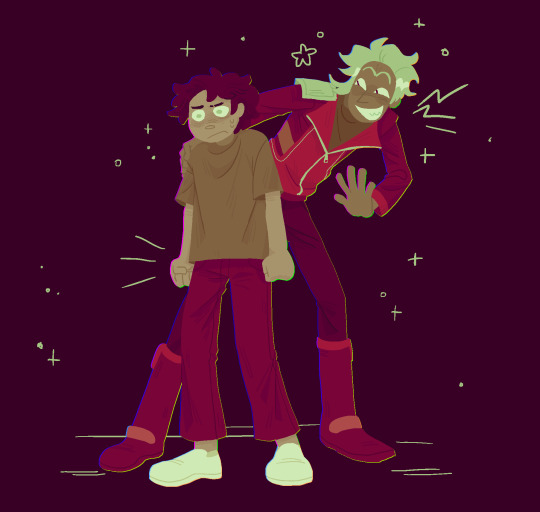
no offense but i genuinely fear that their potential dynamic will go severely underutilized
#rick and morty#morty smith#prime rick#my biggest fear continues to be 'morty gets kidnapped by prime to bait c137'#because i think it could just. be so much more neat if morty and prime actually formed some kind of relationship independently. good OR bad#like idk imagine if morty is coaxed to join primes side out of some misguided attempt to protect his family#would sure be fitting for a character that clearly values his family and their safety idk!!!#and like. god imagine what morty mighjt think of prime#like he currently only has rick's perspective of prime. and obviously whether he wants to or not he sort of Has to rely on what rick says#idk imagine morty meets prime and hes like damn this dude is pretty cool. whether its because prime is putting on a deliberate act#or morty just Genuinely Thinks he's cool#ohhhhhhh imagine this is how they bring the morty mindwipe thing back.#prime would b like 'did you know c137 left the parts of you that disagree with him in a video game? isnt that fucked up morty'#theres just so much TO DOOO and im so terrified of NONE of this happening#bcs the writers seem to be physically incapable of prioritizing anyone but rick#LIKE GOD PLEASEEEE i know they only care abt the redditor audience BUT PLEASE do something ANYTHING with morty im about to start crying#went on a little rant lol sorry. can you tell i really like morty.
796 notes
·
View notes
Text
im thinking about celestia and the abyss being literal opposites (chaos and order) and im thinking about childe and lumine being sort of embodiments of that, just not in the way we think. after the latest natlan quest its clear to us what the fatui intends and what they want- i think the tsaritsa more than anything loves humanity, which is why she directly opposes celestia who are known for bringing down different civilizations. childe, as Her weapon and Her blade is an extenction of that: he's a blade forged by the abyss, bathed in Her holyness, meant to strike down those who sin. lumine (talking solely about traveler lumine) is the literal sister of the prince of the abyss, she has clear ties to it and at this point in the story still is hesitant about fully opposing him (i love angst). her entire story revolves around chaose and disrupting celestia's (and the fatui's) order. isnt that fun
i think what childe longs for the most is control- control of himself, his life, his powers, his story, his fate. i think what lumine wants the most is freedom, which is just another phacet of chaos
anyways. you see it. the themes are theming
#i think! childe's character is more interesting if you understand his devotion to the tsaritsa as a way to cope with his abyssal corruption#he wants to be good. he needs to be good. he'll do anything She says because She is holy#and the thing with lumine is just. well obviously she opposes the abyss and the abyss order#but i think what scares her the most is how much she understands her brothers motivation#because in his place she wouldve also done the same (also that is what literally happens in the game if you choose aether as the traveler )#the traveler's achilles heel is their devotion towards the people around the#them *#so she cant even entirely disagree with him because she gets him. because theyre the same in blood and flesh- two parts of a whole star#its why dainsleifs question (do you believe your sibling to have betrayed you?) goes unanswered#to make long matters short- lumine sees more of herself whithin the abyss than whithin celestia#and that scares her#childe on the other hand strives to shine in his goddesses light- anti-celestia or not she's still a goddess meant as an envoy +#for the heavenly principles (how can she oppose that which completes her?)#idk if its a mistranslation but childe has voicelines about stepping on the god's throans#does he hate celestia because they have what he will never have?#the answer is yes- a thought that probably also terrifies him and he probably hates himself for it#anyways#chilumi#need i say more
61 notes
·
View notes
Text
Dick: Damian, why do you keep trying to stab people?!
Damian: Umi didn't raise a quitter.
Jason: Damn right, I didn't.
Dick: *rubs his frown *
#Being the older brother is very difficult#Isn't that so Dick?#Based on my hc in which Jason took care of Damian during his time in the League of Assassins#''Umi/أمي'' is ''mommy'' in Arabic according to Google Translator BTW#Damian calls Talia “Mother” and Jason “mama/umi/mommy”#This since due to Talia's multiple occupations was Jason the one who took care of him most of the time#Also because he was abysmally more affectionate than she was#I repeat it's my headcanon#You can disagree with me obviously#Jason took care of Damian in the LoA#Damian has two moms#mama jason#damian wayne#damianwayne#damian robin#robin damian#dc robin#robin dc#robin#dick grayson#nightwing#jasontodd#jason todd#redhood#red hood
305 notes
·
View notes
Text
Complaining abt Suicide Squad yet again but the fact that they have Waller exposing the alien community to space racist attacks and talking abt how she got to her position through deceit and being a terrible person and stuff is just. Ahsfiwueh JUST SAY YOU DONT KNOW WALLER.
Anyways literally the 3rd mission of the Squad ever (and the first framed as smth Waller picked and not orders from above) was the Squad discrediting and stopping a rogue vigilante who was only arresting POC and funneling white people into white supremacy groups (of which he was the most prominent member) in SUICIDE SQUAD #4. and it's explicitly framed as this mission being personal for Waller that she's hiding from the government bc its illegal like. Guys. Please why are we having her incite (space bc comics) racist attacks now
Also the whole "Amanda got her position through deceit and being a terrible person" NO. she KEPT her position through being shitty and playing complicated political games!!! She wasn't always that way like there is a difference and it is IMPORTANT ppl PLEASEEEE. In Secret Origins #14 we learn Amanda's backstory and she used to be a normal, caring person! Like even after she entered into working in government and politics she wasn't automatically morally bankrupt like please people. She was originally given control of the Squad by Reagan (*sigh* 80s comics...) to distract and get rid of her because she was so successful at pushing progressive social policy in Congress. Acting like she's this static pillar of evil is such a waste of her character and so fucking uninteresting and disrespectful to her arc it drives me MAD.
Like I am NOT saying Waller is all sunshine and rainbows, she fucking SUCKS (said w love <3) but like there's a human being there. It's a progression, she has a character arc like please, DC, please!!! They've fucked up Waller so bad and made her so opaque and uninteresting she can't even be the protagonist of her own story for fucks sake!
Like I don't know how many times I have to scream it until DC hears me or remembers but WALLER IS THE MAIN CHARACTER OF SUICIDE SQUAD. ITS HER BOOK. yet right now she's a cutout to be used as the villain wherever the writers please. Even in her book we get none of her perspective really displayed, no exploration of her thoughts with any kind of understanding of the role she traditionally has played and was made to play in the story.
#its like youre unable to root for her in any form. which is annoying bc shes actually awesome actually#also having her say “actually im the good guy fuck you'' w/o any actual deep analysis of her psyche or whatever while doing these things#doesnt count as development or showing shes 3 dimensional. its just having 2 dimensional waller say shes right when everyone is obviously#supposed to believe shes wrong#anyways i want real waller back please i miss herrrrrrrr#anyways hope mr john ridley has read secret origins no 14. i know its from 1987 but please guys please. my only hope#also it was a few months ago but i think they tried to push certain elements of a diff backstory in dream team and sorry but fuck that. and#any mention of another waller background like my eyes are closed sry. im a preboot truther#actually im just ignorant of most squad comics outside the original series. im gonna do a readthrough and become knowledgeable on other#stuff i just need to find time. so if im wrong then sorry if its smth factual and if you disagree with my opinion then uh sorry for ur loss#anyways shoutout to the time i had a nerd night w my one friend and she was asking me abt dc and said my favorite villains and i said waller#and silver swan. and she had a “yuck WHY” to waller and a ???? to silver swan. love shouting out my faves and explaining them to the less#informed. didnt say a number 3 but would probably be parallax ig. idk hes kind of slay. or maybe someone else honestly i like hal but waller#and nessie are blorbo level for me i could think abt them for hours#or maybe it wouldnt be parallax actually idk who my 3 would be. hes definitely up there but way below the other 2. maybe the cheetah#interpretation that i personally have. v different from the popular cheetah interpretation esp rucka vers actually. much closer to the pérez#and esp develops some subtext there surrounding barbara and the exploitation and theft of sacred cultural artifacts and pieces but also#like british colonization a lil bit#but i actually despise the cheetah that lives in my head but think shed be interesting to use narratively and see diana fight#vs the other guys who i find interesting and sympathetic and like for themselves#whereas my fave interpretation of cheetah can rot in hell#i got off topic here#blah#swishy rant#also disclaimer that w the main character ik dreamer is the main character of dream team. im talking more in general and that amanda should#always have a huge role as shes the main character of the squad and yet is treated like its villain and not its protag#sui sq
96 notes
·
View notes
Text
I love helluva boss....however, I swear to God, if the sins meet because of Stolitz or they actually give a damn about an imp and goetia dating
I swear to god
I will rewrite all of season 2 and maybe some of s1
#not a criticism really or complaint i mean- i cant wait to see what they do with the show!! but....#look me in the eyes and tell me the sins would care#THEY WOULDNT#Mammon MIGHT becaus eblitz fucked with his show#BUT IF HES AT A TRIAL FOR STOLAS THEN IT DOESNT AFFECT BLITZ#it doesnt make any sense what do you meeeeean!?#hazbin hotel#hazbin hotel vaggie#hazbin hotel charlie#chaggie#mentioned only though#helluva boss#helluva boss asmodeus#helluva boss mammon#helluva boss satan#helluva boss blitz#helluva stolas#stolitz#i mean this in a light hearted but serious way#obviously their gonna do what they do with the show....that doesnt mean i cant disagree or think of better plot lines for the characters#i specifically have one for stella/octavia that would show stella/their dynamic more in depth and expand octavia
144 notes
·
View notes
Text
genuinely think it's good and healthy to follow at least one person in each of your fandoms who reblogs good gifsets but has just...absolutely dogshit takes on the show, or who ships that ship you despise. keeps things fresh. keeps things grounded. you gotta stay humble
#lauren feels things#fandom#this is mostly a joke post#obviously create the experience on tumblr that yOU want#you are not obligated to do any fucking thing on this website#but like....there are a few people I've been following on my other blog#(my real and anonymous one where I do most of my reblogging/fandom stuff)#and I've been following them for YEARS#or they're mutuals from the fandoms I've written fic for#and they just post the most out of pocket shit#or they ship ships that totally squick me out#or - the most annoying sin of all to me -#they post sanctimonious explanations about how the creators/actors/whatever#really feel THIS way about this particular thing#and all you other fans are wrong#(and like......no they don't. unless that actor or writer has said that#you have no idea they think that. also it doesn't matter what they think.)#but I'm honestly not kidding when I say this makes my personal fandom experience better#bc a) some of these people are just pals I disagree with!#and b) none of them are - like - toxic or anything#there's a certain kind of fandom discourse I do not tolerate#these people are mostly just kind of silly sometimes about stuff#and ultimately harmless#but it helps me understand a fandom better#and the fact that I've been doing it for like a decade now#means that i truly never get offended or hurt or feel any kind of way#when I see a bonkers take on something#bc I'm just like 'oh sure you're wrong but whatever good for you seems like you're having fun'#and sometimes ppl in fandoms take things SO PERSONALLY!#and it's okay that some people who make art you like or amazing gifsets feel differently about the thing you both love
47 notes
·
View notes
Text
2am thought but if at some point they make emily a canon lgbt character, i’m so scared they won’t make her a lesbian, maybe bc she has dated men at some point or something. i obviously don’t mind if any other female character was to be/is bi or pan or anything else in the show, i’m all here for it; but emily needs to be a lesbian if made canon. she was supposed to be one, her character’s experience throughout the show is compatible with lesbianism, having dated men in the past doesn’t invalidate someone’s lesbianism, and just lesbians deserve to have one character to claim. in major tv shows like that, we have no one, and emily was supposed to be one of us. we lost that once, so i don’t want us to lose that a second time. if she was to be canonically lgbt, lesbians deserve to have her and need her for representation. the rest can have everyone else.
#they’re so never addressing her sexuality#doesn’t mean i can’t think about it#i obviously don’t have any claim on a character’s sexuality#so if you disagree that’s fine#i just don’t want to hear about it#lesbian emily prentiss#emily prentiss#criminal minds#criminal minds evolution#thoughts
57 notes
·
View notes